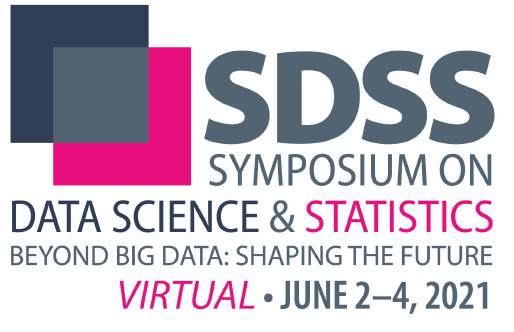Featured Speakers
SDSS 2021 featured three plenary panel sessions focusing on high-profile topics.
2020 Census

D’Vera Cohn
Pew Research Center
D’Vera Cohn studies and writes about demographics in the United States, especially the census. Cohn was a Washington Post reporter for 21 years, mainly writing about demographics, and was the newspaper’s lead reporter for the 2000 census. Before joining Pew Research Center, she served as a consultant and freelance writer for the Brookings Institution and Population Reference Bureau. Cohn is a graduate of Bryn Mawr College and a former Nieman Fellow. She is an author of studies on the marriage and birth rates in the United States, migration between the US and Mexico, and US population projections. Cohn manages Pew Research Center’s @allthingscensus Twitter account. She has spoken at national journalism conferences about how reporters can make use of demographic data in stories and often talks about the center’s findings in print and broadcast media.

Nancy Potok
NAPx Consulting LLC
Nancy Potok is the chief executive officer of NAPx Consulting. She served as the chief statistician of the United States in the Executive Office of the President until January 2020, during which time she served as a commissioner on the US Commission on Evidence-Based Policymaking and co-chair of the Federal Data Strategy. Prior to that, she served as deputy director and chief operating officer of the US Census Bureau; deputy undersecretary for economic affairs at the US Department of Commerce; senior vice president for economic, labor, and population studies at NORC at the University of Chicago; and chief operating officer at McManis & Monsalve Associates, a data analytics and organizational transformation firm. Potok has been an adjunct professor and senior fellow at The George Washington University and is a fellow of the National Academy of Public Administration and nonresident fellow at the Urban Institute. She also chairs the board of trustees for the Institute of Pure and Applied Mathematics at the University of California, Los Angeles, and serves on the board of visitors for the University of Pittsburgh School of Computing and Information. She is a contributing editor to the Harvard Data Science Review. Potok earned her PhD from The George Washington University Trachtenberg School of Public Policy and Public Administration.

Hansi Lo Wang
NPR
Hansi Lo Wang (he/him) is a national correspondent for NPR based in New York City. He reports on the people, power, and money behind the 2020 Census. Wang received the American Statistical Association's Excellence in Statistical Reporting Award for covering the Census Bureau and Trump administration's push for a citizenship question. His reporting has also earned awards from the Asian American Journalists Association, National Association of Black Journalists, and Native American Journalists Association.
Equitable and Inclusive Data and Technology

Safiya Noble
University of California, Los Angeles
Safiya Umoja Noble is an associate professor at the University of California, Los Angeles (UCLA) in the department of information studies, where she serves as the co-founder and co-director of the UCLA Center for Critical Internet Inquiry. She also holds appointments in African American studies and gender studies. She is a research associate at the Oxford Internet Institute at the University of Oxford and has been appointed as a commissioner on the Oxford Commission on AI & Good Governance. Noble is a board member of the Cyber Civil Rights Initiative, serving those vulnerable to online harassment, and serves on the NYU Center Critical Race and Digital Studies Advisory Board. She is the author of a best-selling book on racist and sexist algorithmic bias in commercial search engines, Algorithms of Oppression: How Search Engines Reinforce Racism, which has been widely reviewed in scholarly and popular publications. Noble is the recipient of a Hellman Fellowship and the UCLA Early Career Award. Her academic research focuses on the design of digital media platforms and their effect on society. Her work is both sociological and interdisciplinary, marking the ways digital media affects and intersects with issues of race, gender, culture, and technology.

Stephen T. Ziliak
Roosevelt University
Stephen T. Ziliak is professor of economics and faculty member of social justice studies at Roosevelt University and conjoint professor of business and law at the University of Newcastle-Australia (2014–2020). He is a member of the ASA Antiracist Task Force and faculty member of the Angiogenesis Foundation. A major contributor to the “ASA Statement on Statistical Significance and P-Values,” he is best known for an antiracist statistics book (with Deirdre N. McCloskey)—The Cult of Statistical Significance: How the Standard Error Costs Us Jobs, Justice, and Lives—showing, among other things, the damage done by a culture of mindless significance testing, the history of wrong turns, and the benefits that could be enjoyed by reimagining our little-understood Guinnessometric roots. Ziliak’s current research is focused on Guinnessometrics, a name he gives to (as he puts it) a refreshing and balanced, repeated, small sample, and oomphful alternative to large, one-and-done RCTs and little p-values. He has written about the neglected role of feelings and justice in economics and allied fields, such as in “Haiku Economics: Money, Metaphor, and the Invisible Hand.” Learn more about him at https://blogs.roosevelt.edu/sziliak.

Jamelle Watson-Daniels
Data for Black Lives
As director of research at Data for Black Lives, Jamelle Watson-Daniels is building a research strategy and agenda to uplift Black scientists, organizers, and activists. She is crafting a vision for the role of Data for Black Lives in the fields of machine learning, algorithmic fairness/accountability/recourse, and artificial intelligence. Watson-Daniels is a scientist, researcher, and visionary from a small town outside St. Louis, Missouri. With her interdisciplinary research experiences, she focuses on empowering and centering those most marginalized in the mission to use data as protest, accountability, and collective action.
As part of the five-year combined degree program, Watson-Daniels graduated from Brown University with two degrees: a Bachelor of Science in physics and a Bachelor of Arts in Africana Studies. She is currently a PhD student in applied math at Harvard. From conception to algorithmic deployment, Watson-Daniels believes agency and power must be shifted from the hands of a few tech giants to the masses of people fighting for liberation.
Impacts of COVID-19

Lily Wang
Iowa State University
Lily Wang is a tenured professor of statistics at Iowa State University. She earned her PhD in statistics from Michigan State University in 2007. Prior to joining Iowa State in 2014, she was a tenured assistant/associate professor in the department of statistics at the University of Georgia. Her primary areas of research include data science; machine learning; methodologies for functional data; imaging data; spatiotemporal data; and the application of statistics to problems in economics, neuroimaging, engineering, epidemiology, environmental studies, and biomedical science. Wang is an elected fellow of the Institute of Mathematical Statistics and an elected member of the International Statistical Institute. She is the recipient of multiple awards from the National Science Foundation, the research fellowship from the American Statistical Association/National Science Foundation/Bureau of Labor Statistics, and the M. G. Michael Research Award from the University of Georgia. Wang currently serves on the editorial boards of the Journal of the Royal Statistical Society, Series B, Journal of Nonparametric Statistics, and Statistical Analysis and Data Mining.

Sara Del Valle
Los Alamos National Laboratory
Sara Del Valle is a scientist and deputy group leader for the Information Systems and Modeling Group at Los Alamos National Laboratory. She leads an interdisciplinary team focused on detecting, understanding, and forecasting infectious diseases using heterogeneous data streams and mathematical, computational, and statistical models. Most recently, her team has been investigating the role of large-scale data analytics such as satellite imagery, internet data, and climate on complementing traditional approaches to inform infectious disease modeling. Her work has led to new insights on human behavior’s effects on disease transmission, the role of mixing patterns on disease spread, the role of social media to inform nowcasting and forecasting, and modeling approaches to forecast infectious diseases in real time.

Juan Lavista Ferres
Microsoft
Juan M. Lavista Ferres is the general manager and lab director of the Microsoft AI for Good Research Lab, where he works with a team of data scientists and researchers in AI, machine learning, and statistical modeling. These efforts include projects in AI for Earth, AI for Humanitarian Action, AI for Accessibility, and AI for Health. Lavista Ferres joined Microsoft in 2009 to work for the Microsoft Experimentation Platform, where he designed and ran randomized control experiments across different Microsoft groups. He also worked as part of the Bing Data Mining team, where he led a group applying data mining, machine learning, statistical modeling, and online experimentation on a large scale, as well as providing data services for Bing. Lavista Ferres started the Microsoft efforts related to SIDS (Sudden Infant Death Syndrome) and his work has been published in Pediatrics. His work has been covered by more than 100 news outlets around the world, including The New York Times, Chicago Tribune, USNews, USAToday, and CNN.
